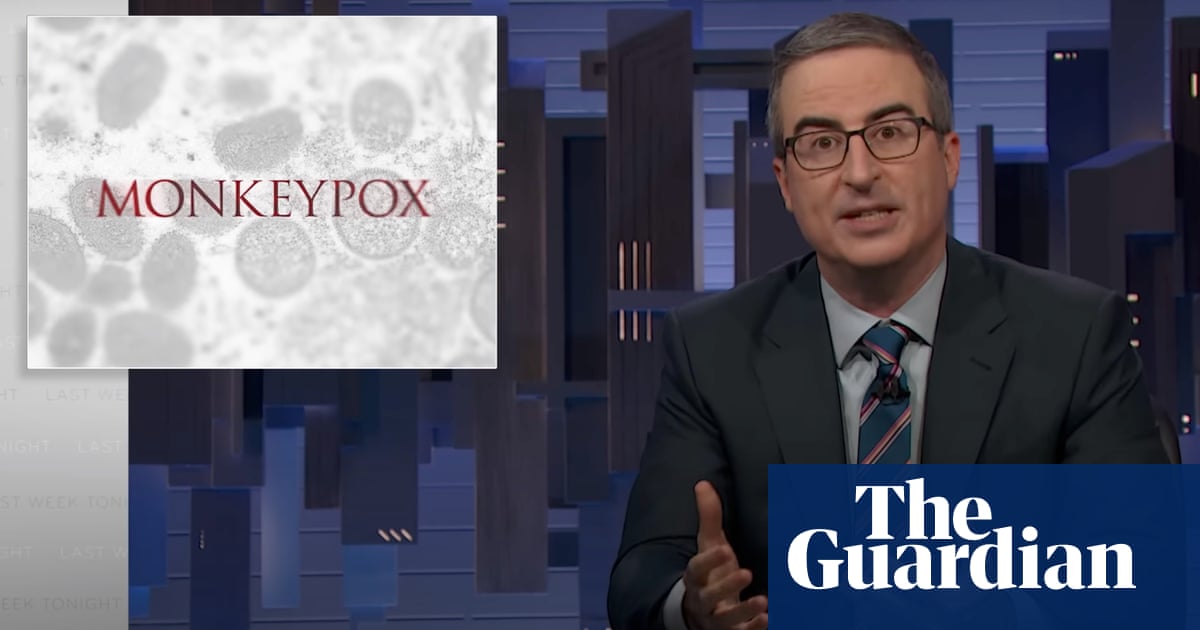
John Oliver on US handling of monkeypox: ‘On a scale of 1 to 100, we scored a no’
John Oliver took on misinformation and confusion around the monkeypox virus, whose spread in the US is “genuinely alarming” not least because in many cases, the disease causes skin lesions that can be extremely painful. “Frustratingly, despite the fact that we’re still in the middle of the Covid pandemic, we seem to be replicating some of its key mistakes, from persecuting strangers to spreading misinformation, to badly mismanaging the public health response,” the Last Week Tonight host said on Sunday.
Oliver started with the basics of monkeypox, a pox virus from the same family that causes smallpox, although it is much less transmissible and rarely fatal. It presents in humans with fever, swollen lymph nodes, exhaustion, headache and a rash; it can cause blindness if lesions reach the eyes, and in rare cases can lead to death. The virus was first discovered in captive monkeys in Denmark in 1958, though it’s mostly carried by rodents. Monkeypox is endemic in rodents in central and west Africa, where it has occasionally spread among humans for several years now.
As of Oliver’s taping last week, the vast majority of monkeypox cases in the US were among men who have sex with men, spread through sustained skin to skin contact and believed to be spread most commonly during sex. In rare cases, the virus can spread through respiratory droplets during prolonged, close face-to-face contact or through bedding or towels used by a person with monkeypox.
Oliver delved into the many reasons it was reasonable to believe that the outbreak in the US could be kept under control. First, there are existing tools to fight monkeypox. “This was not like the early days of Covid, where we didn’t know anything about anything,” Oliver said. “Remember March 2020? We were Lysol-ing our groceries like they came out of the sewer, [Fox News contributor] Geraldo [Rivera] was on TV claiming you could test for Covid by holding your breath, and we did a show on the coronavirus on March 1, 2020, in which the main advice that we gave our full, unmasked studio audience was to wash their hands.”
“But with monkeypox, we were in the fortunate position of having pre-existing tests, vaccines, and treatments,” he continued. “Unfortunately, the rollout of each of them has been painfully flawed.” Testing was initially siloed within the CDC and its network of public health labs, and eligibility criteria made the process slow and cumbersome.
On the vaccine front, the US had stockpiled smallpox vaccines post-9/11 in fear of a bioweapon, or as Oliver said, “one of the one ways in which the War on Terror made us safer.” But the US let 20m doses of a monkeypox vaccine expire, “which seems especially unconscionable,” said Oliver, given that “multiple African countries have had outbreaks of monkeypox for decades now and might’ve appreciated a shot or two. Sharing vaccines would’ve served two purposes – basic human decency but also abject selfishness in that stopping outbreaks over there might well have prevented the current outbreak over here.
“And yet for some reason, we let the vaccines sit unused on a shelf in our reserves like an expired Chobani or a $90m movie on HBO Max,” he added, referring to Warner Brothers Discovery shelving the near-completed Batgirl movie last week. At one point there were only 2,400 doses available in the US, making vaccination like winning the lottery or, as Oliver put it, “the Beyoncé concert tickets of healthcare – announced with little warning, gone in 30 minutes, and will likely have you screaming ‘you won’t break my soul’ at the top of your fucking lungs.”
There have been improvements on all fronts, but “the delays we’ve seen in fixing these problems have been absolutely maddening,” said Oliver, “and it’s been hard not to wonder if the lack of urgency has anything to do with who’s been getting hit the hardest.”
“You have to believe that if monkeypox were spreading largely through heterosexual sex, things would be drastically different,” he continued. “By now, you’d probably be able to get a free vax with purchase at every J Crew in the country.”
“It is not homophobic to acknowledge who is currently most affected,” which is gay and bisexual men, sex workers and people who participate in sex with multiple partners. “What is homophobic is when you blame or shame the people who are suffering, or when you decide you don’t need to care about this because you don’t see their lives as valuable or their suffering as consequential. And that is where there are strong echoes of the Aids crisis in some of the discussion around monkeypox.”
Oliver looked ahead to the next crucial six to eight weeks: “we need to be ramping up testing and data collection, and getting vaccines and antivirals to those who need them the most.” More broadly, “we badly need to restructure our public health system so it is better able to respond to a viral outbreak”, because even with basically all the tools in place to handle a monkeypox outbreak, “on a scale of 1 to 100, we scored a no.
“For far too long, we’ve indulged in the magical thinking that viruses that exist somewhere else a) don’t matter, and b) will stay there,” he concluded. “Monkeypox is such a clear example of how flawed and racist that thinking is. We had 20m doses of a vaccine that could’ve helped countries in Africa that were known to be high risk for outbreaks, and we didn’t help them. And we’re still not helping them.”































![iFi's GO Bar Kensei Dongle DAC Supports K2HD Technology With Some Samurai Swagger [Updated] iFi's GO Bar Kensei Dongle DAC Supports K2HD Technology With Some Samurai Swagger [Updated]](https://i0.wp.com/cdn.ecoustics.com/db0/wblob/17BA35E873D594/33FF/45A11/QTXOLJR4xDKSNMMk2WlTgjaIlvSgcYpeU1xJzUwIoYs/ifi-go-bar-kensei.jpg?w=768&ssl=1)
























